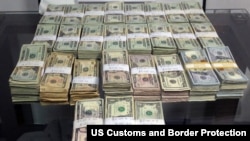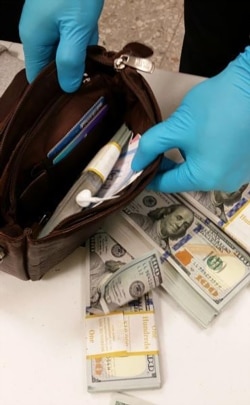A little-known U.S. anti-money laundering law is costing international travelers millions of dollars a year, raising concerns of civil liberties’ advocates that many innocent people are unwittingly being swept up by a statute designed to catch criminals.
The law, known as the Bank Secrecy Act, requires travelers leaving and entering the U.S. with more than $10,000 in cash to report it to customs officials at ports of entry. A traveler’s failure to disclose the precise amount can result in the money being seized – even without any charges against the person.
Customs and Border Patrol officials see the law as an important tool in combating money laundering and potential terrorist activities. But critics say CBP does little to warn travelers about the currency reporting requirement and that the agency’s seizure practice is sometimes unconstitutional.
“The government just assumes that anyone traveling with a large amount of cash is a criminal, takes the money on the spot, and then lets the person go only to then violate federal laws and regulations that require the agency to return the money or go before a court to justify the seizure,“ said Darpana Sheth, an attorney with the Institute for Justice, a public interest law firm in Washington.
In recent years, the Institute for Justice has taken CBP to court to reclaim money taken from international travelers and to challenge the federal agency’s policies.
In one case in 2017, CBP seized more than $58,000 from an Albanian immigrant at Cleveland’s Hopkins International Airport and planned to keep it through civil asset forfeiture, a legal procedure that allows law enforcement to seize property without bringing criminal charges. The man and his wife had saved the money to fix up a house in their native country.
In another case last year, a Nigerian-American nurse from Texas had $40,000 seized from her at Houston’s George Bush Intercontinental Airport, money she was carrying to build a clinic for women and children in Nigeria.
In both cases, CBP returned the money only after the Institute sued the agency.
The Institute for Justice’s lawsuit on behalf of Nigerian nurse Anthonia Nwaorie challenges CBP’s policy of demanding that travelers agree not to sue the agency before they can get their money back.
“No one should have to waive their constitutional rights to get back property, which they are already legally entitled to,” the Institute for Justice's Sheth said.
In its class action lawsuit, the Institute says that while incoming international travelers are often handed a customs declaration form, there is no similar process for outbound travelers.
“Most people have never heard of this requirement because the government does very little to notify people of this or publicize it,” Sheth said.
CBP declined to comment on the lawsuit, citing the pending litigation.
International travelers carry large amounts of cash for a variety of reasons.
“Some conduct real estate sales, some pay vendors in cash and get discounts or some try to avoid wire transfer fees,” said Jennifer Diaz, a customs and international trade attorney based in North Miami, Florida.
One client, Diaz said, was carrying cash because of a religious prohibition against using financial institutions. To get the client’s money back from CBP, “we got a letter from their religious leader stating so,” she said.
Jason Wapiennik, a Michigan-based lawyer who represents travelers before CBP, said currency seizures disproportionately affect immigrants and other foreign-born travelers from countries with a cash economy.
“My clients are probably fairly representative of the whole class of people who are having money seized from them,” Wapiennik said.
“Seizures are happening around the country and probably at every airport and every border crossing in the United States on a daily basis,” he added.
The numbers are big. On a typical day, CBP seizes nearly $300,000 in undeclared or illicit currency. Last year, the agency seized close to $65 million in cash from international travelers, mostly at airports. While the gross figure has remained steady in recent years, CBP’s Detroit field office earlier this year reported a year-to-date increase of 62% in cash seizures.
But it’s not just failure to report that can result in confiscation of cash. Misreporting the amount of cash can also lead to seizure. Wapiennik said that while in the vast majority of cases, the law is “fairly applied,” CBC officers sometimes appear bent on catching violators than helping travelers comply with the law. He said he once had a client whose report was “literally off by a dollar.”
“I think oftentimes people aren't given enough opportunity to report the money or to understand you know the importance of giving an accurate number,” Wapiennik said.
Asked to respond to the criticism, CBP referred VOA to agency guidelines that allow violators to revise the initial reported amount of currency to the agency. In a statement, a spokesman said that “lack of comment should not be construed as agreement or stipulation with any of the allegations.”
International travelers can try to reclaim their seized money by filing a petition with CBP. But they have to be able to prove that the money had a legitimate source and intended use, a process that can take about six months.
Ill-gotten cash and property seized from criminals is forfeited and then put in a fund run by the Treasury Department. The proceeds are then shared with victims of crime as well as law enforcement agencies to conduct more seizures.





